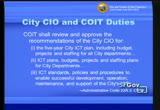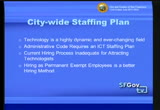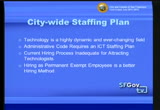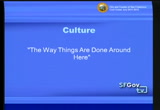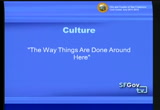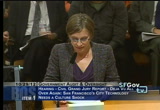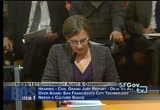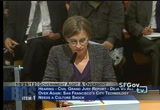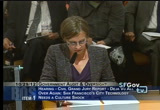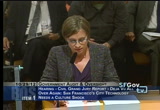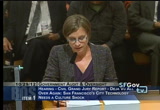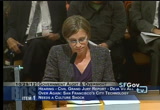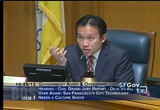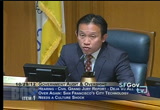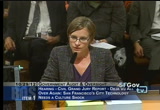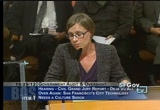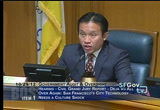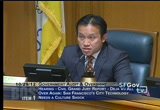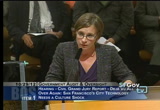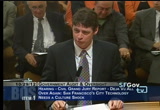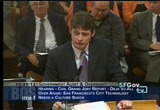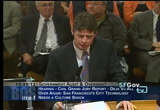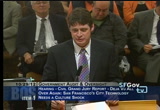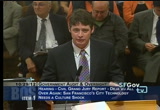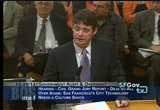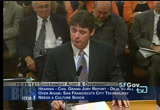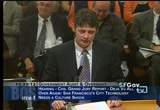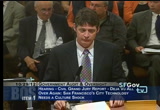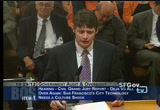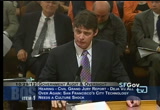tv [untitled] December 26, 2012 10:30pm-11:00pm PST
10:30 pm
cost savings come from department to department for the city for any of the consolidations. isn't there is a need -- didn't i just do this? we propose a consolidated city wide ict budget and staffing plans. we propose a survey of ict performance from departments that is updated periodically. we propose console daitd ict management asset system for these purposes. we propose a data base for personnel. maybe we have enough data but we're not collecting the right useful data. everyone agrees that hiring for technology needs to be improved. technology is a highly dynamic and ever changing field. no one can predict the
10:31 pm
five years of technology or what talent will be required. of your cell phone. the administrator requires a staffing plan. doesn't exist. there maybe hurdles to overcome but hiring as permanent exempt is better than the traditional civil service for technology. it reduces time to hire. it raises proakt of attracting top talent. it means hiring mistakes can be corrected easily. it's done elsewhere in the city. lawyers and our attorney departments do have at will status for the same reasons as we find with technology. isn't it worth the effort to match talent with what is needed? culture is a mighty force. it provides comfort in
10:32 pm
it's traditions. it's a safe haven u because it's tried and accepted. it's reinforced because it's troublesome to change but culture all blinds to the other ways of doing things evening if the other ways hint of doing better. it stifles and shuts down i thinking. it doesn't anticipate the unintended consequences of changing times. this grand jury is not the only voice that called more direct relationship between the city cio and budget leaders or a budget plan or urged reform to technology practices so they match the dynamic technology world, or any of the other recommendations in our report, but the way things are done around here is so embedded in san francisco government culture that the potential benefits to the san francisco community that have
10:33 pm
been raised, not just by us, are more than ignored. they are mocked by a city administration fearing change. we believe that only the mayor can make the changes that we and others have proposed. no one else has the direct authority over government operations than he has. he can do it if he is willing to put the passionate leadership he puts in attracting tech business to the city and improving the organization and technology within san francisco government. perhaps we have to wait for a different administration for there to be a fair hearing on ways to improve technology. perhaps you, the board of supervisors, can take up this challenge. we hope you will. there was a better ending to our title report, deja vu all over again. that is "where there is a will there is a way .". thank you. >> thank you for the time and
10:34 pm
effort put into that report. any questions right now president chiu. all right. with that i would like to ask the mayor's office to come up. cindy is here representing the mayor's team with some responses and perhaps follow up questions. >> good afternoon supervisors. i am cindy, deputy director of the marrow's budget office and here to speak to the reports. i am going to keep my response fairly brief and will answer any questions you have in the hearing. as you know ie.d t and innovation are among the mayor's top priority and shares in the task force and focusing on government efficiency, effectiveness and responsiveness through innovation and it. since he's been in office he's pointed the first chief innovation officer and along with supervisor david chiu
10:35 pm
announced this position with strengths and open data legislation. the mayor recognizes that through technology we can better serve our citizens. we appreciate the civil grand jury's work on kreapting this report and interest in technology. however we disagree with several of the assertions of the civil grand jury and believe their comments reflect incomplete understanding of how the it services work. the report doesn't recognize much of the recent progress made. we acknowledge there have been many frustrations in the past and in many cases those frustrations continue today. technology moves quickly. government doesn't always move as quickly. there are times and inherent tension between departments and central offices that arise when resources are limited. there is always room for improvement. however, we
10:36 pm
are encouraged by the recent progress and collaboration and are confident about the success of ongoing and future efforts. some examples of recent successes are two years ago we did produce the first ever five year ict plan. this year we will update that plan and working with coit, the cio, and the controller's office on that report and open to feedback on how we can make it more useful to the board, departments, and to the public. the city email conversion project. i know that the civil grand jury points that as a failure or a ongoing frustration. i think we see some of the recent success and progress we're optimistic. right now 3600 users, 27 departments and some of the largest departments are slated for conversion in the next months and library is slated for
10:37 pm
conversion and additional 1300 accounts and others in january. our largest department with another 7100 accounts. data center consolidation and virtualization has been so successful that the scope has been expanded. initially the project was to convert or relocate 900 servers and 750 have been virtualized and 400 identified as candidates and 300 additional for relocation and total of 1400 servers, much larger than the originally scope of the project. this is also a sign of collaboration among the departments and one of the data center is housed at the airport and not in our department of technology. enterprise agreements have recently been completed with bm ware and adobe and projected to save the city money over the next few years
10:38 pm
and asset management and equipment maintenance should be completed within the next few months. i would also like to address some specific concerns that were raised in the civil grand jury report. one is the issue of hr and recruitment. we understand that there are many frustrations with the civil service process and we hear this all the time, particularly as it results to it positions. however we are required by law to abide by the civil service process to ensure that hiring is non diskrom tory. we believe in some cases the stability offered by a civil service job can be an attracting recruiting feature. we agree that more flexibility is needed and that's why we asked human resources to see how we can make that possible. we
10:39 pm
don't believe a charter amendment is needed and we believe a solution can be found. we also do not believe that the role of the cio and the director of department of technology need to be separated. many departments -- the department head focuses on external issues and deputy focuses on the day-to-day operations. we do not want an admin code to tie our hands with this decision. we want the flexibility to consider the individuals in these roles and their ability to determine the proper structure for the city and the department and these individuals. we also do not believe there needs on to be a formal reporting relationship. as with many central administrative functions like human resources or finance there is a central body with policy making authority and oversight along with departmental staff.
10:40 pm
we believe that this model can work, can and does work for technology. departmental staff have a responsibility to fulfill their department's mission while working within the policies and guidelines set by the central agency. staff around the city can and do communicate with each other in format set scption like at coit meetings and other meetings and at monthly lunches and calling each other when they have questions. i think that's all of the sort of specific things i would like to address right now but we are able to answer questions later. i am here today with the cio, the chair of coit, the controller office and representatives from many departments so in conclusion of my statement i want to thank the civil grand jury for their work and interest in this area. however of the examples i discussed there is
10:41 pm
progress being made. we believe as departments, coit and cio learn from the experiences they of collaborating with each other future projects will benefit from the lessons learned in these last big projects there is a culture of change that needs to be happening and we are doing it and we would rather work toward this than criticize them of the weaknesses. >> president chiu. >>i have a couple of questions and i want to acknowledge the progress that we have made in coit and throughout our situation in the city. we have made some progress when it comes to email. 3600 emails that you mentioned out of 26,000 of moved over. i want to single out the airport and their work on the data center. i am hoping that
10:42 pm
the first it project on time and on budget, and i also know that the project emerge made a lot of progress after the controller took over and i think that is worth celebrating as well as the two enterprise agreements you referred to. from my perspective it's not about the glass full or empty and it's 10% full. if you look at that we have 80% of the emails not moved over. we have a justice project 15 years behind, and over ten million dollars over budget. the fact that we have countless enterprise agreements still not different i think it's important to celebrate the progress, but from my perspective there are so many things that we have not been able to get done, and i wanted to ask you how is the administration looking at changing the overall culture?
10:43 pm
why should it take four years from zero percent to 20% email consolidation? should it take 15 years to consolidate the criminal justice data bases? should we have three departments and spending millions of dollars into and no one talks to each other? when i attend coit meetings and one staffers with department heads and talking with or at each other it's not clear to me there is leadership that is on the same page and moving us forward and that really is the basic question i'm trying to get at. >> okay supervisor. i think that one of the things that we have seen in the most recent years with the downturn i think departments and the city were sort of shocked of working together more than they had in the past, so as we were talking about the culture that needs to
10:44 pm
be changing i think in some ways the recession forced the issue on departments and projects stalled before the recession are now moving forward and the email conversion and data consolidation. i think they're realizing through this collaboration they can gain access to projects and technologies they wouldn't be able to have access to on their own, or be able to operate on their own, so i do believe that recently with this progress departments are learning, and are -- departments are learning and making progress and it takes time to build the relationships, but now they're being built and we're seeing success i believe it can only snow ball and accelerate from here so we are working hard with coit and the cio to make sure that continues
10:45 pm
to happen. the presence of kate howard at the coit meeting shouldn't be an indication that the mayor doesn't make this a priority. his scheduling conflicts and difficulties and you can understand yourself he can't be everywhere at once and the continued presence and stability offered by kate being at those meetings who also negotiates department's budgets and looks at other cross city wide issue areas like capitol. she is able to provide the leadership that the mayor is looking for and i think you're looking for. >> and i certainly appreciate that. i think the challenge that i see is that you have a department of technology that should be coordinating more of the centralized functions and yet there doesn't seem clear direction to the departments that they need to cooperate and play ball, and i appreciate your point about how the recent budget challenges we had over the last years forced things.
10:46 pm
two concerns i have, as the budget picture improves, how do we make sure the pressure there is there to continue the cooperation and two, twr the grand jury report it's not clear there are the formal levels of communication and authority to ensure that decisions are going to be made and stuck to. i mean for example at coit we had countless presentations on these projects you talked about: email consolidation and data centers and et cetera, and we set deadlines and budgets and every couple of months the deadlines are blown of the budgets have been blown as well, and it doesn't give me very much confidence that as a city we have a governance structure that actually works. it feels way too unwilding at this point and i understand the challenges of
10:47 pm
the mayor's schedule and all of our schedules and being present at these meetings but be sure there is clear directive and direction and accountability and every time we hear of a another schedule or budget slip or not met there isn't seem to be any consequences and that's what i find most troubling. >> i don't think supervisor we want to be punitive with departments in all cases. it wouldn't lead to future success on projects, so there are ways in which we can exert control through the cio review process, through budgeting, through approval of positions, and we're working on that, and we certainly take that authority seriously but are not sure that being punitive is always the way to go. >> which i appreciate as well. i understand how you don't necessarily want to punish departments that aren't doing the right thing, but i don't see incentives also for anyone to
10:48 pm
be shooting for higher goals, so again i don't know what will push the bureaucracy to change its culture in that five years we're not here and someone else is my seat and supervisor farrell's seat we're not having this same exact conversation again. >> i hear your concerns. >> all right. thank you president chiu. thank you cindy for the presentation and for the department of technology john. john, how are you? we have john from the department of technology and wanted to speak as well and welcome. >> thank you supervisors and thank you civil grand jury for your report and everyone attending. i want to take a few moments. i don't want to rehash the stuff said and commented on and you probably want a rich dialogue in question and answer period. i want to visit a few of points and give context to
10:49 pm
the conversation and like you i am fascinated by the title of the report and we should revisit a little bit and after being here for five years now where we have been and where we are coming to. in terms of deja vu let's reflect back where we were as individuals with technology or as an organization with the city. when i joined the city we didn't have a plan or a governance structure or coit and sun shet and talking about creating this structure and we were struggling how much money were we spending on it in the city? when i came here there wasn't a report? and so it has been a long and complex journey, and i think it will continue in these hearings and going forward to be one of the challenges. i think we use technology on a daily basis and work and we are
10:50 pm
engaged and are we getting our money's worth and getting the service we want? and i wanted to revisit and my staff will tell you it's easy to hammer on the things not going well and i want to re-cap of the last five years and whether we're making progress in solving the problems and some of the projects are project related, operationally related and to your point president chiu and look back over the last four cio's and embedded in the organization and we need to talk about those in different conversations and i will be brief and i don't want this to be a marketing campaign, but we have made significant accomplishments. we developed koitd and open transparent project in the city. we have
10:51 pm
15 engaged department heads for that do make the time to come to the meetings and you president chiu are often at those meetings and we have a dialogue that didn't exist before. in addition we have subcommittees that meet on a monthly basis and architect subcommittee, a performance subcommittee and resources and look at how things should be permanenting and planning and budgeting committee and that is a forum for all those disinfranchised and all of those not part of this participate and members of the subcommittee and come "here are my concerns and policies we need to have in place" and have that forum to interact. we all interac informally certainly on a daily basis but it creates that forum "hey i work in the tech sector and why aren't you doing this" and it creates
10:52 pm
that forum for that dialogue. one of the challenges are and with coit and i will take responsibility and we all do is communication. too many times i talk to groups or individuals and they're not aware of the meetings are and what the topics are and certainly we need to engage in a better communication plan how to get the word how and talk about what we're doing and actively engage in more rich communication. but despite all of that we have accomplished things in the last five years. we have a robust project and budgeting things going on and in it we're not focused and we have hundreds of projects in the city and again five years ago we had no data base. we had no list of
10:53 pm
the projects so frankly we didn't know if we were getting them on time or not and we didn't have a context and where we were spending the money. we have had the same chair for the last five years on that subcommittee and created the effort and every year and this is what we're doing in the upcoming year. this is the money that we need. unfortunately as you know in tight budget years we can't fund everything but we have the opportunity to say so-and-so is doing a similar project and maybe collaborate with them in a joint project and we are having that dialogue. can it improve? certainly and we look to improve that every year and out of that budget committee was the genis of the plan and is it visionary? is it where we want to be in five years? even though i'm the
10:54 pm
cio i couldn't tell you where we were going to be in five years ago. if you said i was going to do work on my ipad and no phone and it's hard in the moving word of technology to predict things so i think the it plan was certainly a stake in the ground and grew out of a laundry list of the projects that we knew were coming but we tried to put strategic context to it and when we voted we knew it would have to change. we knew we couldn't predict five years out but wanted a stepping stone and that's what the plan did and create a starting point. you have to start somewhere so it's a first draft. it was an attempt to articulate where we were going and the appendix was a lot of projects and and context. how are we going to get there financially? and i
10:55 pm
have done plans and sometimes they're dream documents on a shelf and ten years later and wonder why i thought we were going there. i think for me as an it professional these strategic plans are more meaningful and revisit them on a regular basis and is it still valid? is this where we want to go? and just like an investment plan. you wouldn't leave them there and five years later see where it's at and i think that is important and the department of technology i have to take my cio hat off and i know there is conversation around this bigger governance structure in the city and what the department of technology is doing. as you know the department has under gone like many in the city significant changes in the last five years. like so many departments it's been tough through the budget reductions and things like that to
10:56 pm
redefine ourselves and rediscover where the best value is at the city. we had to give up traditional services and focus on core services but i think it's improving and i would certainly own and recognize that the department of technology has had some challenges over the years and performing its duties from a performance measure stand point but i challenge you to talk to the cio's in the room as the civil grand jury has and ask them if they feel it's improving or getting worse? we all have challenges balancing the strategic and project and operational duties and sometimes we succeed and sometimes there are unfortunately failure, but i would suggest to you that if you did ask the cio's and called them up or informally in the hallway. are they heading in the right direction? is their heart in the right place? are
10:57 pm
they listening and doing what they need to be for you? i think they would say yes and to that point you could look back at our track record over the last two years. we made the budget reductions without significant impact to our customers. we put the budget from 95 to $73 million done that without our people, our customers out in the departments not getting dial tone on their phone and still getting email and still having sfgtv broadcast 14 more commissions than in the past and we have grown our controller services and unfortunately we had to pull back on others and ones we couldn't afford to do anything or find contractors to do those or departments themselves. i know it's hard. it's a self discovery i think for an organization to look internally. i think one of the things we struggled with as a city we're are asking ourselves
10:58 pm
if we can do better and i agree. there are always opportunities to do better and the conversations around performance and are we performing to our ideals and standards? and you have to define what those goals and standards are. the department of technology, as president chiu you pointed out, we had an audit in the controller's office and said we needed better performance measures and we have been providing those for several years now and i suggest to you because we are highly centralized organization for the city that we do that for the entire city and i think there is confusion about what we do and compare it across the city to all of the it organizations across the city, every organization that does it, then we could start developing a common understanding, common baseline of what the performance looks like, and when we are satisfied living up to our own
10:59 pm
expectations and i am happy to tell you and i know we're wondering if we are making progress, and i think externally we are making progress. the city has won seven awards for it excellence this year and we have struggles but we are making progress around mobility and open data and transparency is which are significant and when you talk to other large cities and i work with new york and l.a. and boston and we talk about what we're working on and san francisco is one of the leaders they look up to and how to do it and we are doing things on a national scale people are taking notice of and doing that and i heard a lot of talk, and i come from the private sector so when i first got here one of the questions i got "how
122 Views
IN COLLECTIONS
SFGTV: San Francisco Government Television Television Archive
Television Archive  Television Archive News Search Service
Television Archive News Search Service 
Uploaded by TV Archive on

 Live Music Archive
Live Music Archive Librivox Free Audio
Librivox Free Audio Metropolitan Museum
Metropolitan Museum Cleveland Museum of Art
Cleveland Museum of Art Internet Arcade
Internet Arcade Console Living Room
Console Living Room Books to Borrow
Books to Borrow Open Library
Open Library TV News
TV News Understanding 9/11
Understanding 9/11